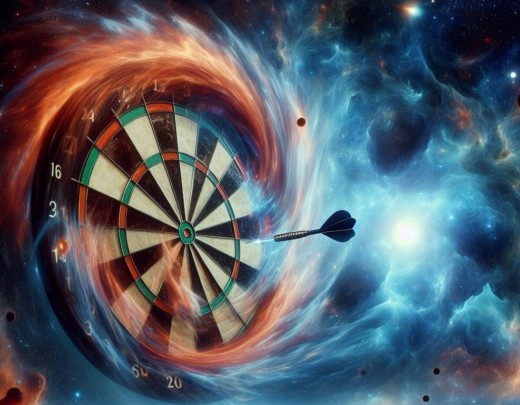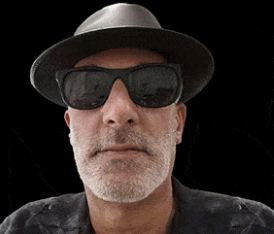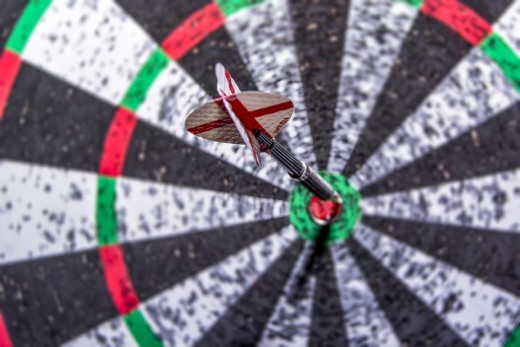Tuesday, February 27, 2024
Column 657
A great player’s years of unsportsmanlike behavior have prompted these words…
There have been some incidents on the American darts circuit that underscore the need for some sort of serious process, perhaps even a regulatory authority, to be established to sanction those who bring our sport into disrepute. In this exciting time when darts is rebounding at the grass roots and flourishing at the uppermost levels there is no place for anyone unwilling or unable to conduct him or herself in a respectable manner. For the good of the sport, it is incumbent upon the governing powers to individually and jointly establish a clear code of conduct and a system to enforce it.
Let me give you a few examples of actions that have no place in our sport, at any level, and should be cause for penalizing the offending player or players. If you don’t agree I’ll put out my joint, disrespect you, your spouse or significant other and your kids, fling my darts across the room, toss my beer and punch your frickin’ lights out.
The bad news is that all of this occurs. The good news is that the offenders are few but habitual. The mystery is why such actions are permitted to continue. It’s mindboggling that even the PDC, CDC and WSDT seem unwilling to address the actions of the player who prompetd these remarks.
Some say that since local leagues and the American Darts Organization (ADO) are volunteer-driven outfits there just isn’t the manpower or budget to monitor and control such behavior. I say this is bunk, nothing but a weak excuse to sidestep dealing with the issue or, worse, to let friends off easy by turning a blind eye to conduct we wouldn’t dream of condoning in other areas of our lives.
Some years ago, I had a discussion with former ADO president Sandi Cain about the ADO’s role in monitoring the sport. She explained that staffing and budget considerations required that this sort of thing be left to the leagues and tournament directors. I don’t see this as a problem. I see it as an essential part of the answer. Similar conversations more recently with several other darts officials only reinforce the sensibility and practicality of this component of the solution.
Those who act during league and at tournaments in ways that would see them ejected from any workplace or restaurant and any other type of sporting event in the civilized world bring nothing but disrespect to themselves and our sport. They turn newcomers away, adding to the struggle of leagues and local tournaments to survive and reinforce the stereotypes that have held top-level darts back from proper sponsorship and big-time exposure for decades.
I wonder exactly how the governing bodies go about sanctioning leagues and tournaments. Are there criteria? Is there discussion and a vote at board meetings? Or is any league or tournament just accepted as a matter of course? And how is membership reviewed or renewed?
I wonder because it would just seem reasonable that leagues and tournaments should agree to meet certain expectations before being admitted as a member of a national governing organization. When Tom Fleetwood established the ADO system, tournament sanctioning was a way to guarantee players that they could count on receiving the winnings they earned. It worked.
Now, decades later and in a much different world, it is time to put more teeth into the sanctioning system, not just at the ADO but at every single one of the governing organizations.
In order to be admitted as a member league and to have its tournaments sanctioned, a league should be required to have an annual independent audit and their audited financial statement should be a formal part of the application and renewal process. Players should know that the funds they entrust to their local leagues are managed honestly.
It is also time that leagues and tournament directors be required by their sanctioning organizations to monitor and enforce a code of conduct and take swift and very specific actions in certain clearly defined situations if they wish to maintain their status as an accredited member league or sanctioned tournament.
Nobody wants to walk into a league match and week after week have to tolerate the actions of those few who consistently disrupt play. A system that is grounded in a code of conduct that is specific, that means something, and deals with those who flagrantly disregard it, is certain to prove beneficial to the sport. The imprimatur of sanction by a governing body that required a code of conduct and demanded it be enforced would undoubtedly help many leagues retain membership and attract new blood.
In the case of tournaments, the power of such a system would be that if rules were not enforced and sanction was lost the attraction would be gone for players who travel to earn ranking points. It would therefore behoove organizers at the local level to tow the line to retain their sanction.
The rules of conduct and the penalties for violating them must be clear and specific, developed and adopted by each of the governing bodies, and enforcement of the rules and sanctioning violations must be a fundamental part of any partnership agreement between any league and their governing body. The rules and penalties for violating them should be standardized and all of the governing bodies should cooperate by enforcing penalties handed down by any one of them individually so sanctioned players can’t jump from one organization to another.
What might be included in a reasonable universal policy to help ensure acceptable conduct and sportsmanship throughout the sport of darts across America? The following should be included on any list:
- Pushing or striking an opponent, spectator or official,
- Any action which causes damage to a hosting facility,
- Any on-site violation of any public law,
- Harassment, mocking, heckling, badgering, insulting, challenging/taunting an opponent, their spouse/significant other or kids,
- Repeated flagrant acts of unsportsmanlike behavior, and
- Cheating or deliberately throwing a match.
Any player who commits the most egregious act of punching another player or spectator should be ejected on the spot from whatever event the violation takes place and banned indefinitely from participating in any darts event anywhere in the country sanctioned by any of the governing bodies and should be prohibited from participating in any national or international event for which they may have previously qualified.
Of course, no sanction should be applied ex post facto. And there should be some sort of appeal process. But most important, the process of establishing the system should begin post haste and it should be embraced jointly by all the governing organizations.
In an age when the sport of darts, steel and electronic, is gaining more and more respectability and exposure it is essential that we all demand certain minimum standards of conduct. If the various national darts organizations in America are unwilling or unable to address this issue independently, they should collaborate in forming a National Darts Regulation Authority.
I wonder about all this not to be critical of the national darts organizations. I have reviewed each of their rules and despite the universal expectation that proper conduct and good sportsmanship govern the sport, I come away unsatisfied.
Just as it is universally accepted that speeding in a school zone is unacceptable – what constitutes speeding and how violators are to be penalized is fundamental to order and fairness in civilized society. It is equally understood that, generally, those who break the speed limit (or any law) are penalized similarly wherever they break the law.
To expect good sportsmanship but not define precisely what falls outside the limits of good sportsmanship, to define the limits but not prescribe the penalties for exceeding the limits and to define the penalties but not enforce them equally across jurisdictions is to essentially have no policy.
In England there is the Darts Regulation Authority (DRA) but as impressed as I am with the concept, I am even more unimpressed with the uneven administration of sanctions. For any such body – in England, America or anywhere – to have the desired effect, it must be run fairly and judiciously according to a published set of clear criteria.
What I am suggesting is that acceptance of an agreement to strictly enforce an explicit code of conduct be required as an integral part of each of the darts governing organization’s sanctioning process for leagues and tournaments – and that it be administered at the local level. If when an offense occurs the required action is not taken, then future sanctioning of the league or tournament should be withdrawn.
Currently, the ADO’s Tournament Rules prescribe that “good sportsmanship will be the prevailing attitude throughout the tournament.” It is further stated that anyone who fails to comply with any of the rules “will be subject to disqualification from that event.” There are sixty rules but all of them, except for one prohibiting gambling, are essentially procedural. In the ADO Representation Agreement for national and international events a player must agree to slightly more specific terms. They must conduct themselves “in a sportsmanlike manner” and there is an understanding that any breach of the Agreement including the “implied code of conduct” could result in a “banning of the player(s) from all future ADO programs for a period to be determined by the Board of Directors.”
The American Darters Association’s (ADA) rule book includes a section called Etiquette that states “Verbal or physical abused will not be tolerated” and raises the prospect of membership suspension or revocation. Under a heading called Conduct During League Play the rules state that evidence of unsportsmanlike conduct including heckling or harassment, foul or insulting language and physical violence shall be cause for penalizing the players or expulsion from the league. There is a process defined for dealing with protests and disputes.
The National Dart Association (NDA) requires that each of its members, as a requirement of membership and renewal thereof, pledge to abide by a Code of Ethics. Although neither the code nor the sanctions for violating it are particularly specific there is no mistaking the intent. There is a process defined for dealing with infractions and mention of a series of sanctions ranging from fines to suspension, and an appeals process.
But none of the governing bodies are specific as to exactly what penalty shall be levied for any specific infraction. None of the governing bodies specifically prohibit a player banned from another organization from participating in their organization.
I ask you: Should a player who lights up a joint (or worse) in the bathroom during a tournament or repeatedly harasses, mocks, heckles, badgers, insults, challenges/taunts an opponent, their spouse/significant other or kids, frequently conducts themselves in an unsportsmanlike manner, flings their darts in anger across the room, slams a dartboard, tosses a drink or strikes another player be tolerated – and if they are not tolerated and suspended or banned by one organization should they simply be permitted to join one of the others, let alone be permitted to “represent” the sport on a world stage? I think not.
The governing organizations have all the best intentions and have made a good start but there’s a long way to go and the time to head there is yesterday. I can’t fathom how taking the necessary next steps can lead to anything but the enhancement of the image and future potential of the sport of darts in America.
From the Field,
Dartoid




